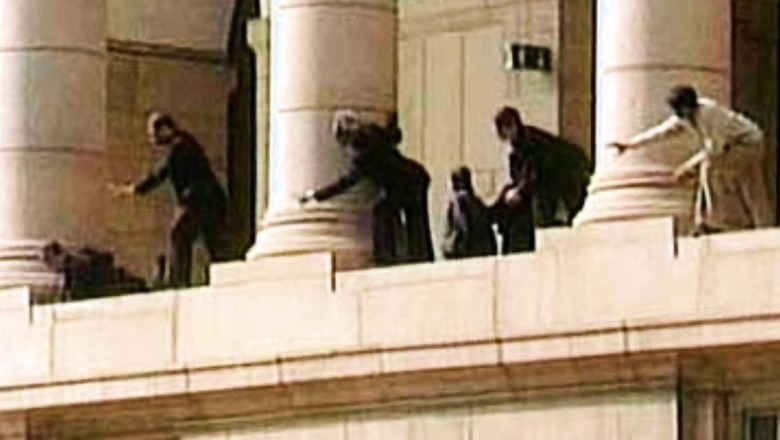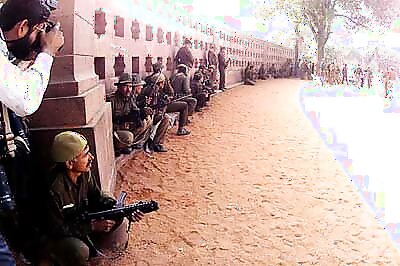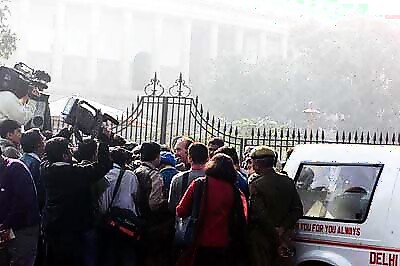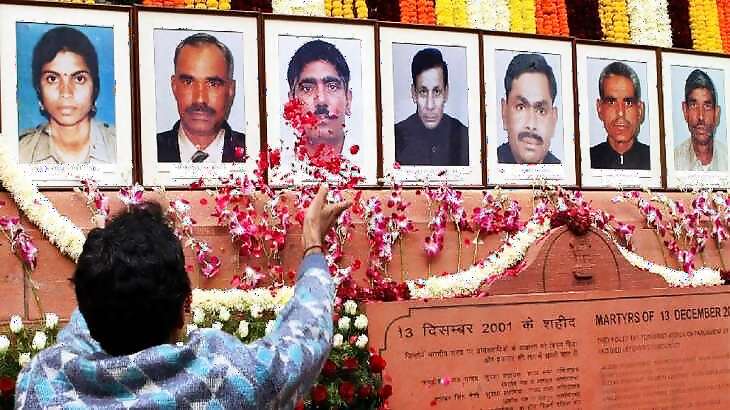
views
On December 13, 2001, five armed terrorists breached the Parliament House Complex during the Winter Session and opened fire for almost 30 minutes, killing nine people and injuring many. 21 years on, the deadly attack which shocked the nation is still fresh in the memories of all who witnessed it.
On the day of the attack, the Winter Session of the Parliament was underway and even though the Houses had been adjourned, there were several parliamentarians and staff present inside the building. Five security personnel of Delhi Police, one lady constable of the CRPF and two security assistants of Parliament Watch and Ward section, a gardener and a photojournalist lost their lives in the attack.
A Look Back at the Horrific Attack
On the morning of the attack, at around 11:40 am, five terrorists from terror organisations Lashkar-e-Taiba (LeT) and Jaish-e-Mohammad (JeM), entered the Parliament House Complex in an Ambassador car with a beacon and a forged Home Ministry sticker.
The terrorists were carrying AK47 rifles, grenade launchers, pistols and grenades and were able to breach the security cordon. However, as their car moved towards Building Gate No. 12, a security personnel got suspicious. The car was forced to turn back and hit then-Vice President Krishan Kant’s vehicle.

Constable Kamlesh Kumari Yadav, who noticed the car, rushed to close Gate no. 1 where she was posted. She was shot 11 times by the attackers and died on the spot but was able to foil a suicide bomb attacker who was one of them.
The gunmen then got down and opened fire. The gunfire lasted for about 30 minutes and all the attackers were neutralised outside the Parliament building itself.
While the 100 or so ministers and MPs in the Parliament at the time were unhurt, nine others were killed and at least 15 injured.
What Happened to the Terrorists?
All five attackers were killed outside the Parliament building. An FIR was filed and the case was moved to the Special Cell of the Delhi Police. Within days, four people were arrested and charged as the masterminds of the attack. They were tracked down with the help of leads linked to the car used by the terrorists and cellphone records.
The four accused were Mohammad Afzal Guru, a former Jammu Kashmir Liberation Front (JKLF) militant, his cousin Shaukat Husain Guru, Shaukat’s wife Afsan Guru, and SAR Geelani, an Arabic lecturer at Delhi University.

The case against them went on for about a decade, with the Delhi Court and the Supreme Court eventually acquitting Afsan and Geelani and upholding the death sentence for Afzal Guru.
Geelani was acquitted for “need of evidence” by the Delhi high court in 2003, a decision upheld by the Supreme Court in 2005 and Shaukat was given 10 years in prison.
In 2013, Afzal Guru was hanged to death and his body was buried in Tihar jail.
‘At First, I thought Someone Burst Crackers’
More than 100 people, including major politicians were inside the Parliament building at the time of the attack. Many government officials, MPs and ministers, including Home Minister LK Advani and Minister of State for Defence Harin Pathak were believed to have been in the building.
Recounting the horror, Bhartruhari Mahtab, a six-time Lok Sabha MP of the Biju Janata Dal, who was an MP at that time, told Hindustan Times in 2019 that at first he thought someone was bursting crackers.
“I clearly remember that on December 13, 2001, I was at the Central Hall of the Parliament chatting with other Members of the Parliament when I first heard what sounded like crackers being burst. Then I heard the sound of an explosion,” he said.

The politicians were “rushed into the Central Hall and the area was secured,” he said. “In the middle of all this chaos and tense moments, rumours began to spread: one said that terrorists had reached the top of the building and wanted to blow it up. It was terrifying, and luckily, it was proved to be wrong,” he said.
Senior Bharatiya Janata party (BJP) leader LK Advani who was then the Home Minister called the attack “the most audacious, and also the most alarming, act of terrorism”.
He said that the attack “was executed jointly by Pakistan-based and supported terrorist outfits, namely, Lashkar-e-Taiba and Jaish-e-Mohammad. These two organisations are known to derive their support and patronage from Pak ISI.”
India-Pak Ties
Ties between India and Pakistan were extremely fraught following the attack which triggered the “biggest ever peace time mobilisation of the India military”, a Times of India report from 2013 says. The attack had brought the two countries to the brink of another war, the report says.
The mobilisation — Operation Parakram — saw over 500,000 Indian soldiers mobilise at the border, as per many estimates. While the Operation was later criticised for achieving little, the BJP and NDA government credited it for the historic 2004 Islamabad statement in which Pakistan promised to not let its soil be used for terrorism against India.
Subsequent terror attacks in India, including the horrific 26/11 attacks in Mumbai in 2008, Uri and Pulwama among others further intensified tensions. Relations seem to have gone into a deep freeze after India retaliated to Uri and Pulwama, a Times of India report from 2020 says.
India-Pakistan relations have now “entered an age of minimalism”, DU professor Happymon Jacob wrote in The Hindu last month. “There is a certain ‘cold peace’ between the traditional rivals — on the Line of Control, inside Kashmir and in the verbal exchanges between the two sides,” he said.
Tighter Security, Extra Patrolling
Since the attacks, security arrangements in the national capital have been tightened.
Extra police personnel have been deployed to keep an eye on all suspicious activities this year, as per IANS. Delhi police senior officers have been briefed to conduct extra patrolling in their areas to avoid any untoward incidents.
While security around the Parliament has tightened, the question of whether we are better prepared to foil similar terrorist attacks elsewhere is infinitely more complex.
Retired air vice marshal Manmohan Bahadur in 2021 wrote about the issue in the Indian Express. “Intelligence cannot be 100 per cent successful (though this cannot be an excuse for repeated failures), but the capability to address the follow-up of an incident has been found wanting too,” he said.
The greatest tribute to those who died in the Parliament attack, he said, would be, “a quiet and determined bi-partisan approach to confront the menace of terrorism.”
Read all the Latest India News here

















Comments
0 comment